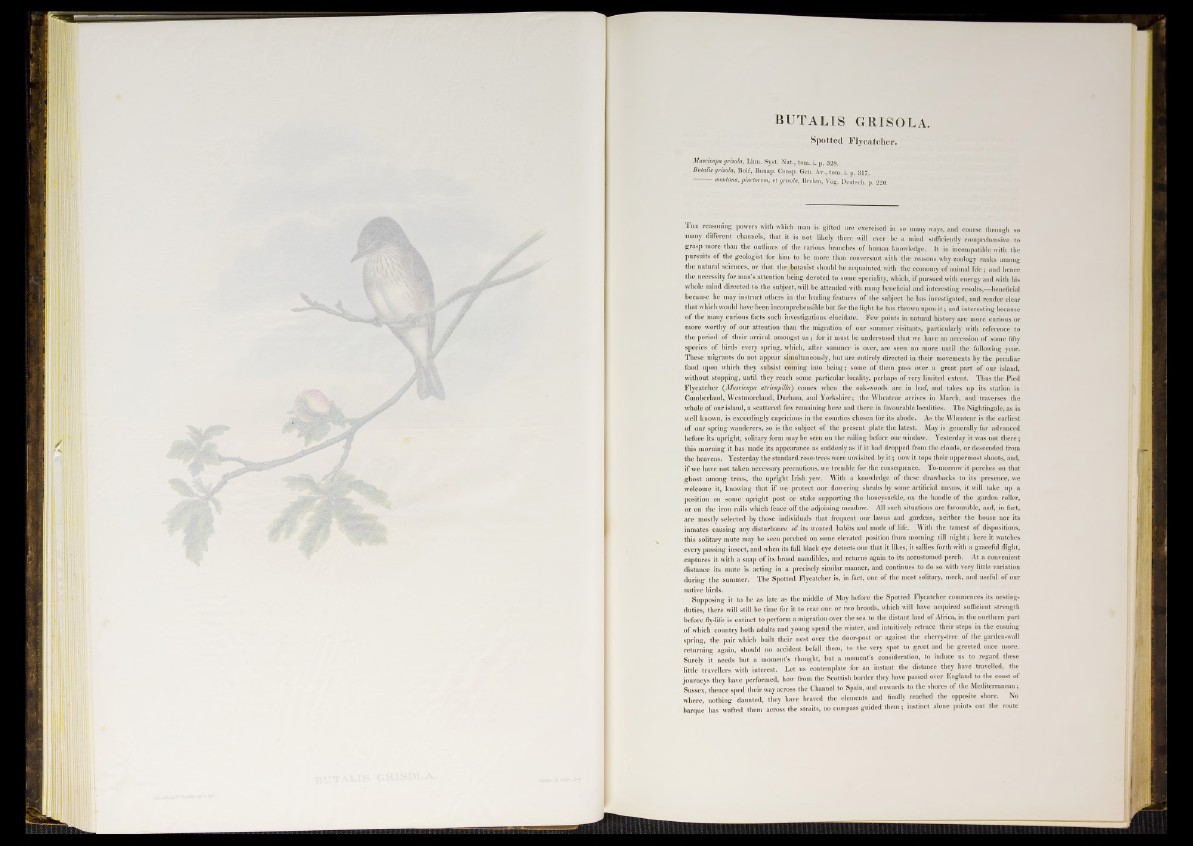
BUTALIS GRISOLA.
Spotted Flycatcher.
Muscicapa grisola, Linn. Syst. Nat., tom. i. p. 328.
Butalis grisola, Boie, Bonap. Consp. Gen. A y ., tom. i. p. 317.
montana, pinetorim, et grisola, Brehm, Yog. Deutsch. p. 220.
T h e reasoning powers with which man is gifted are exercised in so many ways, and course through so
many different channels, that it is not likely there will ever be a mind sufficiently comprehensive to
grasp more than the outlines of the various branches of human knowledge. It is incompatible with the
pursuits o f the geologist for him to be more than conversant with the reasons why zoology ranks among
the natural sciences, or that the botanist should be acquainted with the economy of animal life; and hence
the necessity for man’s attention being devoted to some speciality, which, if pursued with energy and with his
whole mind directed to the subject, will be attended with many beneficial and interesting results,—beneficial
because he may instruct others in the leading features of the subject he has investigated, and render clear
that which would have been incomprehensible but for the light he has thrown upon i t ; and interesting because
o f the many curious facts such investigations elucidate. Few points in natural history are more curious or
more worthy of our attention than the migration of our summer visitants, particularly with reference to
the period o f their arrival amongst u s ; for it must be understood that we have an accession of some fifty-
species of birds every spring, which, after summer is over, are seen no more until the following year*
These migrants do not appear simultaneously, but are entirely directed in their movements by the peculiar
food upon which they subsist coming into being; some of them pass over a great part of our island,
without stopping, until they reach some particular locality, perhaps of very limited extent. Thus the Pied
Flycatcher (Muscicapa alricapilla) comes when the oak-woods are in leaf, and takes up its station in
Cumberland, Westmoreland, Durham, and Yorkshire; the Wheatear arrives in March, and traverses the
whole o f our island, a scattered few remaining here and there in favourable localities. The Nightingale, as is
well known, is exceedingly capricious in the counties chosen for its abode. As the Wheatear is the earliest
of our spring wanderers, so is the subject of the present plate the latest. May is generally far advanced
before its upright, solitary form maybe seen on the railing before our window. Yesterday it was not th ere ;
this morning it has made its appearance as suddenly as if it had dropped from the clouds, or descended from
the heavens. Yesterday the standard rose-trees were unvisited by i t ; now it tops their uppermost shoots, and,
if we have not taken necessary precautions, we tremble for the consequence. To-morrow it perches on that
ghost among trees, the upright Irish yew. With a knowledge of these drawbacks to its presence, we
welcome it, knowing that if we protect our flowering shrubs by some artificial means, it will take up a
position on some upright post or stake supporting the honeysuckle, on the handle of the garden roller,
or on the iron rails which fence off the adjoining meadow. All such situations are favourable, and, in fact,
are mostly selected by those individuals that frequent our lawns and gardens, neither the house nor its
inmates causing any disturbance of its wonted habits and mode of life. With the tamest of dispositions,
this solitary mute may be seen perched on some elevated position from morning till nig h t; here it watches
every passing insect, and when its full black eye detects one that it likes, it sallies forth with a graceful flight,
captures it with a snap of its broad mandibles, and returns again to its accustomed perch. At a convenient
distance its mate is acting in a precisely similar manner, and continues to do so with very little variation
during the summer. The Spotted Flycatcher is, in fact, one of the most solitary, meek, and useful of our
native birds.
Supposing it to be as late as the middle of May before the Spotted Flycatcher commences its nesting-
duties, there will still be time for it to rear one or two broods, which will have acquired sufficient strength
before fly-life is extinct to perform a migration over the sea to the distant land of Africa, in the northern part
of which country both adults and young spend the winter, and intuitively retrace their steps in the ensuing
spring, the pair which built their nest over the door-post or against the cherry-tree of the garden-wall
returning again, should no accident befall them, to the very spot to greet and be greeted once more.
Surely it needs but a moment’s thought, but a moment’s consideration, to induce us to regard these
little travellers with interest. Let us contemplate for an instant the distance they have travelled, the
journeys they have performed, how from the Scottish border they have passed over England to the coast of
Sussex, thence sped their way across the Channel to Spain, and onwards to the shores of the Mediterranean;.
where, nothing daunted, they have braved the elements and finally reached the opposite shore. No
barque has wafted them across the straits, no compass guided them; instinct alone points out the route